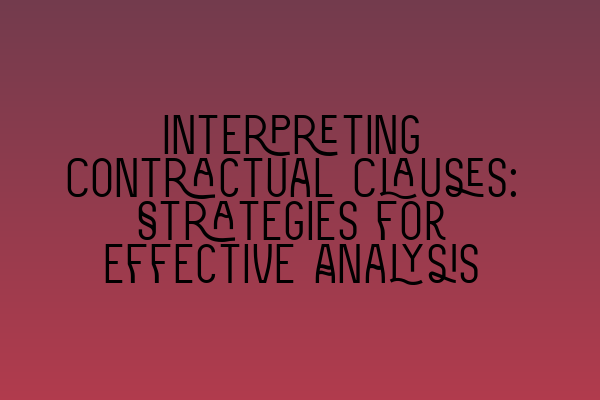Interpreting Contractual Clauses: Strategies for Effective Analysis
As a solicitor, one of the key skills required in contract law is interpreting and analyzing contractual clauses. Contracts are the backbone of any legal agreement, and understanding the language and intentions behind each clause is vital for ensuring clarity and avoiding potential disputes. In this article, we will discuss some strategies for effectively interpreting contractual clauses to help you navigate this complex area of law.
1. Read the Entire Contract
Before diving into the individual clauses, it is important to read the entire contract thoroughly. This will provide you with the context and background necessary to interpret the clauses correctly. Understanding the overall purpose and subject matter of the contract can significantly enhance your analysis of the specific clauses.
Mentorship for Aspiring Solicitors: Nurturing Talent in the Legal Field
2. Define Key Terms
Contracts are often filled with technical and industry-specific terms that may have different meanings in different contexts. It is crucial to define and understand these key terms before proceeding with the analysis. Look for explicit definitions within the contract itself or consult external sources such as industry standards or legal dictionaries to ensure accuracy and precision in your interpretation.
Legal Challenges and Pitfalls: Navigating the Complexities of the Legal System
3. Consider the Plain Meaning
When interpreting contractual clauses, start with the plain and ordinary meaning of the words used. This is known as the “literal rule of interpretation.” It involves looking at the language used by the parties and giving effect to the ordinary and natural meaning of the words, unless there are reasons to believe otherwise. However, keep in mind that this approach may not always capture the parties’ intentions completely, especially in complex or technical contracts.
4. Examine the Surrounding Context
Ambiguities can arise when interpreting contractual clauses, and one way to resolve them is to examine the surrounding context of the contract. Look at the entire agreement, including recitals, schedules, and any other relevant documents, to gain a deeper understanding of the parties’ intentions. This holistic approach allows you to consider the contract as a whole and interpret each clause in light of the others.
The Benefits of Becoming a Solicitor: A Rewarding Career
5. Consider the Purpose of the Contract
Understanding the purpose of the contract is essential for interpreting its clauses accurately. Ask yourself: What problem or issue does this contract seek to address? What are the parties trying to achieve? By aligning your interpretation with the underlying purpose of the contract, you can ensure that the clauses serve their intended function and promote the overall objectives of the agreement.
6. Analyze the Consequences
One effective strategy for interpreting contractual clauses is to analyze the consequences or practical implications of each interpretation. Consider how each possible interpretation would impact the rights and obligations of the parties involved. This approach helps you evaluate the reasonableness and fairness of each interpretation and choose the most appropriate one.
7. Seek Legal Guidance if Necessary
If you encounter complex or ambiguous clauses that require specialized knowledge or expertise, it is advisable to seek legal guidance. Consulting with a seasoned solicitor can provide you with valuable insights and help you navigate through challenging contractual provisions.
Law School in the UK: Your Guide to Starting Your Legal Journey
Conclusion
Interpreting contractual clauses is a critical skill for solicitors practicing contract law. By reading the entire contract, defining key terms, considering the plain meaning, examining the surrounding context, understanding the purpose, analyzing the consequences, and seeking legal guidance when needed, you can effectively analyze and interpret the clauses in any contract. These strategies will help ensure clarity, reduce disputes, and facilitate successful contractual relationships.
